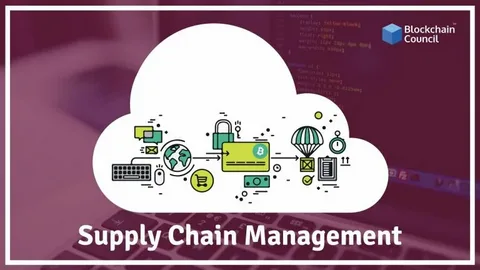How Blockchain is Used in Supply Chain Management
According to blockchain technology, it brings greater transparency, security, and efficiency to different industries. The Blockchain has generated a lot of attention in supply chain management, where companies aspire to eliminate inefficiencies, ensure traceability, and stamp out fraud. Since Blockchain is decentralized and immutable, it is a secure way to keep data recorded and shared by all parties involved in the supply chain, from suppliers to customers. In this article, I explore how Blockchain contributes to revolutionary changes in supply chain management and the various applications in all traditional supply chain management stages.
Transparency in the Supply Chain
Increased transparency is one of Blockchain’s main advantages in supply chain management. The supply chain is a single unalterable ledger held by the Blockchain that essentially records every transaction and movement of goods within the supply chain. It provides all participants with transparency to see the real-time data and be held accountable. By recording and time stamping each transaction, businesses can be assured that the data is being kept accurate and trustworthy, free of disparities, and collaboration between players is increased.
Traceability of Goods
Blockchain technology improves traceability when companies can track a product’s origin and where it gets delivered to the final destination. However, traceability is essential for industries such as food and pharmaceuticals, where the product’s authenticity and quality are paramount. The Blockchain gives a verifiable record of every step the product has taken on its journey that can be verified to ascertain the product’s origin, storage conditions, and handling. This level of traceability gives companies a way to know that the bag they sold to their customer came from them, passed through their facility once, and will not return there for any further process.
Preventing Counterfeit Goods
Most industries also concern themselves with the burden of counterfeit products. Blockchain brings transparency and helps combat counterfeiting by making it impossible to forge and confirm the authenticity of products. Technology allows companies to assign unique identifiers to each item in the Blockchain, creating an unbreakable, tamper-proof record that certifies the product is legitimate. Because Blockchain makes it easy for customers to check the product’s authenticity, it decreases the possibility of purchasing counterfeit goods and assures brand reputation.
Improving Efficiency in the Documentation
Supply chains also have lots of paperwork and paperwork, which slows down the process and raises prices. Documentation is simplified through blockchains with new processes of digitization and automation. Automated execution on predefined conditions, a key feature of Blockchain, makes smart contracts smart: they can automatically execute agreements without manual verification and processing. This automation reduces human error, speeds up transactions, and ensures that both sides adhere to their terms by fulfilling the contract.
It helps Facilitate Better Supplier Verification
Blockchain technology guarantees that companies can document their suppliers. This creates a decentralized record of supplier information and history, which companies can use to evaluate supplier reliability and credibility. This information helps businesses select trustworthy suppliers and not suppliers with poor past performance and a history of noncompliance. Blockchain verifies suppliers through industry standards that a company will work with a partner in the line of ethics.
Cutting Costs and Increasing Efficiencies
Using Blockchain for supply chain management can greatly cut costs by increasing efficiency. Transactions and record keeping are automated, reducing administration costs, and the higher visibility and traceability reduce the chances of costly mistakes and fraud. In addition, blockchain’s transparency allows companies to efficiently manage their inventories, minimize waste, and increase resource allocation. This helps to make a more efficient, more profitable supply chain.
Strengthening Data Security
Blockchain technology is implemented in supply chain management to improve data security using cryptographic algorithms to protect information. As blockchain data is immutable, it cannot be modified or deleted without all participants consenting. This feature is extremely active in tampering with data from unauthorized parties and protecting data to be safe against data breaches. Better data security protects companies’ operations and customer information and ensures that partners and customers trust them.
Compliance and Audit Improvement
Most industries require compliance, and Blockchain can ease the pain of auditing through transparency and accessibility all in one place, knowing exactly what’s taking place. All information on the Blockchain is time stamped and verified — auditors can relatively quickly access and review data, ensuring compliance with industry standards and regulations. The real-time tracking and reporting capabilities of Blockchain make compliance far more efficient and far less resource-intensive in the real world than more traditional approaches.
Allowing Real Time Inventory Tracking
Blockchain provides real-time inventory tracking, meaning companies can know who has what at any time. Visibility into inventory in real-time can reduce occurrences of stockouts and overstocking, reducing the likelihood of allocating the available resources ineffectively. Using Blockchain with Internet of Things connected devices allows companies to track product location, condition, and estimated arrival times in real-time. Proactive decision-making, at this level of insight, helps the overall efficiency of inventory management.
Strengthening Customer Trust
Blockchain technology provides transparency and traceability across the supply chain, increasing customer trust in suggestions. Blockchain allows customers to learn where, how, and who the products they buy come from, as well as the quality, safety, and ethical practices that go into making them. Such transparency positions companies with differentiating features — a commitment to ethical sourcing, product integrity, environmental sustainability, etc. Strong customer trust leads to customer loyalty and, ultimately, brand reputation.
Conclusion
Blockchain technology is transforming how we look at supply chain management; it is transparent, traceable, and, therefore, more efficient. Blockchain eliminates many problems of traditional supply chain operations by allowing for secure data sharing, helping improve inventory tracking, and enhancing supplier verification. From preventing counterfeit goods to automating documentation, they can use the Blockchain to optimize processes, cut costs, and boost customer trust with a powerful tool. With blockchain technology developing, its application in supply chain management will likely rise and enable businesses to create more resilient, ethical, and efficient supply chains.


















